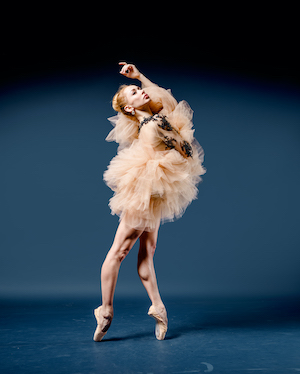The explicit question “Who are you?” is impossible to answer, but experimental choreographer Si Rawlinson puts it to his dancers in Proxy, a piece that demands much more than physical prowess from them. His eclectic approach explores semi-scripted dialogue and infra-red imaging, but the title delivers the answer: we are what others make of us. Laura Vanhulle and Dan Phung interact physically and psychologically. Laura moves as Dan imagines her movements; Dan speaks as Laura manipulates his face, and they dance in the dark as we watch through spy cameras. But technology rules OK: audiovisual artist Dan Lowenstein is on stage with all his paraphernalia and the auto-voyeurism of the ubiquitous selfie is lasciviously demonstrated. Proxy, work in progress, begs to allow us more of two supple, composed and engaging dancers.
Shifted is supernal. From its lyrical opening to its tense conclusion, Natalie Bell’s intricately choreographed depiction of displacement is riveting. The piece has a narrative with a chronology double-defined by the distressful dichotomy of what is taken and what is left when humanity is uprooted. Shifted opens with an image reminiscent of a sea-anemone wafted to and fro by the currents. Is the creature confined or is she firmly rooted? Gabriele Martin moves with a limpid liquidity, but her ankles are tightly bound by the recumbent forms of fellow dancers Brandon Clarke and Samuel Ozouf. A dynamically depicted journey follows the turmoil of fleeing, at sea and on land. The precisely coordinated athleticism of the two male dancers underlines the agitation in this timeless study of expulsion and exile.
Now for something entirely different. Alex James-Cox’s characters in Taffeta Dreaming are displaced from the comfort of their northern hometown to the relentless pressure-cooker of London. Their story, told with well-defined body language, has open humour tinged with sincere pathos. Daisy is very fond of Isaac. Isaac is, however, a bisexual who is “trying to get to like girls”. The story unfolds in a robust blend of contemporary dance with stand-up, consummately delivered by Rebecca Hesketh-Smith and Stuart Thompson. The characterisation is spot-on: the awkwardness of encounter, the embarrassment of getting it wrong, the disappointments are all neatly portrayed, as brassy petulance and coy withdrawal fight for the moment.
Reviewed on 15th of January at The Place by Mark Aspen


